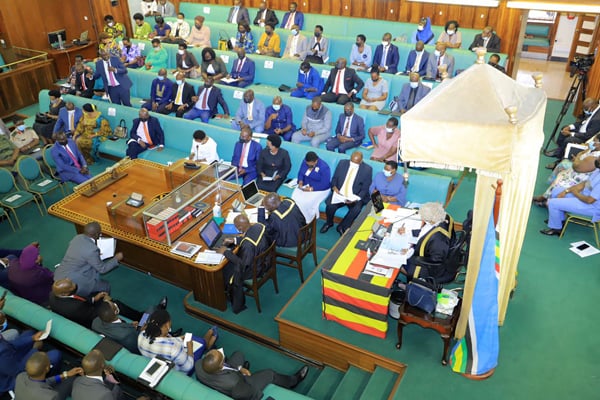Prime
Museveni blocks plot to raise MPs pay

President Museveni
What you need to know:
- On September 7, lawmakers passed the Parliamentary Pensions (Amendment) Bill 2022 in which they voted to increase the member’s contribution from 15 to 20 percent.
President Museveni has rejected a proposal by Members of Parliament to have their pay and pension contribution increased.
In an October 13 letter to Speaker Anita Among, Mr Museveni declined to assent after he was “advised by the Ministry of Finance, Planning and Economic Development that the Bill presented to them for assessment of its financial implication did not include amendments to increase their contribution to the government fund from 30 percent to 40 percent.”
On September 7, lawmakers passed the Parliamentary Pensions (Amendment) Bill 2022 in which they voted to increase the member’s contribution from 15 to 20 percent. This would automatically result in an increment to the corresponding government contribution to individual lawmakers’ monthly pension from 30 percent to 40 percent, increasing the liability paused by Parliament on the taxpayer.
Sources at the Ministry of Finance told this publication that warnings to the House about the contribution increases were shot down.
“The issue is on the adjustment on the contributions, and we had already said it had financial implication, with the government spending more money on Parliament,” a source revealed, adding, “It is also correct that the provision was not in the original amendment.”

Pay increase plan
The pension increase provision as contained in clause 2 of the Bill formed the basis for a recommendation in a report by the Parliamentary Affairs Committee to increase lawmakers’ pay by five percent.
The report adopted by the whole House argued that a higher pension contribution will eat away the monthly take home of lawmakers. It was further held that raising the lawmakers’ pay by a corresponding margin would cover the “loss”
“There is a need to mitigate the loss of available income equivalent to five percent of the emoluments of the member. This loss of income needs to be mitigated by the Commission, increasing the members’ pay by an equivalent value so that the amendment does not pose a financial risk to the members in the short run,” the report states.
A lawmaker presently earns about Shs11m, minus allowances.
While the recommendation, according to the House’s director of communication and public affairs, Mr Chris Obore, did not have a legal effect since it was not part of the original amendment to the Bill, sources intimated that this was a strategic record that lawmakers would easily base on to advance their case for pay increase.
Mr Wilfred Niwagaba, the shadow attorney general, yesterday also reiterated that the recommendation is mere wishful thinking, with no legal effect, since the pay of legislators is determined by the Executive, and the Parliamentary Commission, and not a subject of the Pension Law.
Mr Nuwagaba also applauded the President for returning the Bill, saying a Private Member’s Bill should not bear any liability on the consolidated fund.
The Legal and Parliamentary Affairs Committee chairperson, Ms Robinah Rwakoojo, yesterday confirmed the return of the Bill. She, however, hastened to add that it will be among the priority business on November 1 when Parliament resumes after a month-long recess.
Ms Rwakoojo, who declined to discuss details, said the committee will “act accordingly” when considering the President’s comments and the members’ aspirations.

MPs attending plenary recently. PHOTO/ FILE
Permutations
One possibility is that the 11th Parliament could accept and pass the President’s recommendations. But if they reject them, it will open a standoff where, if the President declines to sign a second version of the Act and Members of Parliament enact it a third time, it will become law without presidential assent.
Mr Museveni has in previous addresses chastised legislators for increasing their pay. Last year, he decried overseas travel by legislators as “lavish” and a form of “pure corruption”.
But in matters regarding their welfare, legislators have been known to find ways to circumvent the Executive’s stand. Last year, Parliament increased the travel and allowance budget for its members and staff by Shs20 billion to Shs420 billion.
Background
The Parliamentary Pensions (Amendment) Bill was first tabled in July by Workers MP Arinaitwe Rwakajara to, among others, ease access to the retirement benefits. The principal law was first enacted in 2007.
The amendment scrapped the requirement of a recommendation by a medical board in favour of any other specialist medical practitioner to ease access for those who seek treatment, or retire, on grounds of poor health.
It also allowed a member midterm access to 20 percent of their pension if they are 45 years or older, and have contributed for at least 10 years.
The law also entitles all former speakers of Parliament and their deputies from 1980, or indeed their dependents, to receive a monthly allowance as a percentage of the pay of a sitting House Speaker.




